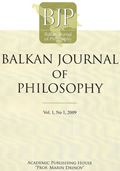“Diagnostic Hedonism” and the Role of Incommensurability in Plato’s Protagoras
“Diagnostic Hedonism” and the Role of Incommensurability in Plato’s Protagoras
Author(s): Tea LogarSubject(s): Philosophy
Published by: Институт по философия и социология при БАН
Keywords: Socrates; Protagoras; Hedonism; Diagnostic Tool; Incommensurability
Summary/Abstract: The dispute over Socrates’ apparent endorsement of hedonism in the Protagoras has persisted for ages among scholars and students of Plato’s work. The solution to the query concerning the seriousness and sincerity of Socrates’ argument from hedonism established in the dialogue is of considerable importance for the interpretation of Plato’s overall moral theory, considering how blatantly irreconcilable the defense of this doctrine is with Plato’s other early dialogues. In his earlier works, Socrates puts supreme importance on virtue and perfection of the soul, so the puzzle apparent in the Protagoras merits a thorough examination. Several scholars have argued that, since Socrates’ defense of hedonism in this work clashes significantly with his views on morality in other dialogues, Socrates must only have been defending hedonism ironically, or with the intention of “diagnosing” his opponent’s point of view. In this paper, I examine the approaches according to which Socrates didn’t in fact mean to defend hedonism, but merely used it as a diagnostic tool; I argue that there is no compelling evidence for this resolution of Socrates’ defense of hedonism, and that the views that attempt to defend it really have no convincing grounds for it apart from the desire to reconcile the Protagoras with other Socratic dialogues.
Journal: Balkan Journal of Philosophy
- Issue Year: II/2010
- Issue No: 2
- Page Range: 127-136
- Page Count: 10
- Language: English

